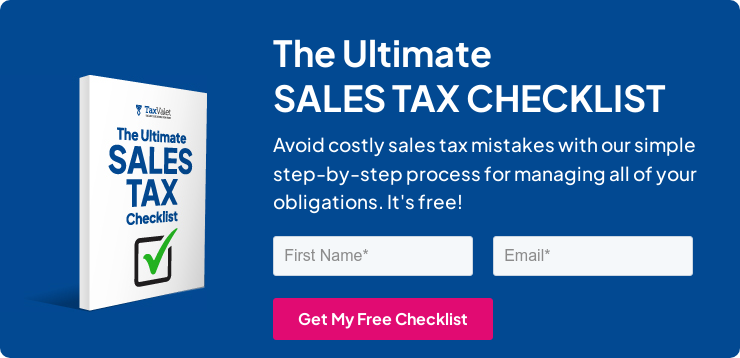Quick Answer: You need to get a sales tax permit in Vermont if you have a physical presence or meet economic, affiliate, or click-through nexus requirements. Read on for more detailed information.
What is Sales Tax Nexus Anyway?
Your business owes sales tax in any state where it has “sales tax nexus”. In short, if you have sales tax nexus you need to collect and remit sales tax. If you don’t have sales tax nexus, you generally don’t need to get a permit.
Sales tax nexus is a legal term that means you have crossed a threshold and now have a sales tax collection responsibility in the state. Nexus can be created by having a physical presence, economic presence, or by other factors. Nexus rules vary by state and retailers have specific nexus rules based on where they have people, property or inventory.
What Should You Do Once You Determine You Have Sales Tax Nexus?
Once you determine that you have sales tax nexus in Vermont, your next step is to register for a sales tax permit in the state. Check out our blog post on getting a sales tax permit in Vermont or more information about that process.
If you are not interested in doing the work of getting the permit yourself, TaxValet can handle the permit registration for you with our Sales Tax Permit Registration Service.
Common Ways to Have Sales Tax Nexus in Vermont
1. Economic nexus in Vermont
If you made $100,000 of sales or at least 200 transactions during a 12-month period in Vermont, then you are required to register for, collect, and pay sales tax to the state. If you meet this threshold, it does not matter if you have a physical presence in Vermont. Nexus has been created based on your volume of sales.
For more information see 32 V.S.A. § 9701.
If you need help determining which states you have crossed economic nexus thresholds, check out our Sales Tax Starter Kit service.
IMPORTANT REMINDER regarding Notice and Reporting requirements: It is important to note that even if you do not cross economic nexus thresholds, you may cross Vermont’s “Notice and Reporting” requirements threshold if you make more than $0 in taxable sales (yes, you read that correctly). The reporting requirements are onerous and the penalties are extremely high for non compliance. You can get around Vermont’s Notice and Reporting requirements by simply registering for a sales tax permit.
2. Physical presence nexus in Vermont
The following creates physical presence nexus in Vermont. If you have any of the following in Vermont you need to get a sales tax permit:
- Place of Business – A person maintaining a place of business in the state and making sales, whether at that place of business or elsewhere, to persons within the state of tangible personal property or services.
- Employees – Solicits sales of tangible personal property either by employees, independent contractors, agents or other representatives.
- Advertising – Engages in regular, systematic, or seasonal solicitation of sales of tangible personal property in Vermont; by the display of advertisements; by the distribution of catalogs, periodicals, advertising flyers, or other advertising by means of print, radio, or television media; or by mail, Internet, telephone, computer database, cable, optic, cellular, or other communication systems, for the purpose of effecting sales of tangible personal property.
- Delivery – Delivery of merchandise in the seller’s vehicle.
- Warehouse – Inventory stored in the state.
For more information, please see 32 V.S.A. § 9701.
If you need help determining which states you have a physical presence in, check out our Sales Tax Starter Kit service.

Uncommon Ways to Have Sales Tax Nexus in Vermont
1. Affiliate Nexus in Vermont
What exactly is affiliate nexus? Affiliate nexus can exist when a business has sufficient contact with a state through a separate business. If your out-of-state business has a relationship with an in-state business, then you may have affiliate nexus.
Please keep in mind that an “affiliated business” does not necessarily mean that it is a marketing “affiliate” in the typical sense of the word. Instead, “affiliate nexus” refers to the relationship between two businesses.
Affiliate nexus applies if either of the following conditions are met:
- Owns or controls a person engaged in the same manner or similar line of business in Vermont, or
- Maintains or has a franchisee or licensee operating under the person’s name in Vermont if the franchisee or licensee is required to collect the sales tax.
For more information about affiliate nexus, see 32 V.S.A. § 9701(9)(c).
2. Click-through Nexus in Vermont
What is click-through nexus? Referrals from in-state entities may trigger nexus for an out-of-state company with click-through nexus. A remote vendor will be presumed to have Vermont nexus for purposes of collecting sales tax if it has agreements with residents to refer customers that led to sales in excess of $10,000 in the previous year.
For more information about click-through nexus, see VT Dept. of Tax.
Do You Need a Sales Tax Permit in Vermont If You Only Sell on Marketplaces?
If you are an out-of-state online retailer who ONLY sells on approved marketplaces (such as Amazon, eBay, etc), Vermont sales tax will be remitted by the marketplace. However, Vermont has not yet released guidance on whether a seller who ONLY sells on approved marketplaces still needs to get a sales tax permit, even if no tax is due. You may want to consider getting a permit in Vermont if you meet any of the nexus requirements, even if all of your sales are on the marketplace.
If you are an e-commerce seller who is unsure of where you need to get a sales tax permit, feel free to check out our Sales Tax Starter Kit service.
Receive Important Sales Tax Updates to Your Inbox!
Join our mailing list to receive free updates that could help protect your business from audit.
Get in Touch
Company
Disclaimer: Nothing on this page should be considered tax or legal advice. Information provided on this page is general in nature and is provided without warranty.
Copyright TaxValet 2023 | Privacy Policy | Site Map

Disclaimer: Our attorney wanted you to know that no financial, tax, legal advice or opinion is given through this post. All information provided is general in nature and may not apply to your specific situation and is intended for informational and educational purposes only. Information is provided “as is” and without warranty.
What you should do now
- Get a Free Sales Tax Plan and see how Tax Valet can help solve your sales tax challenges.
- Read more articles in our blog.
- If you know someone who’d enjoy this article, share it with them via Facebook, Twitter, LinkedIn, or email.


